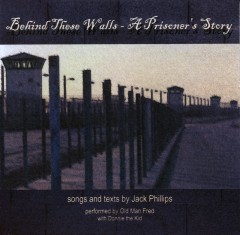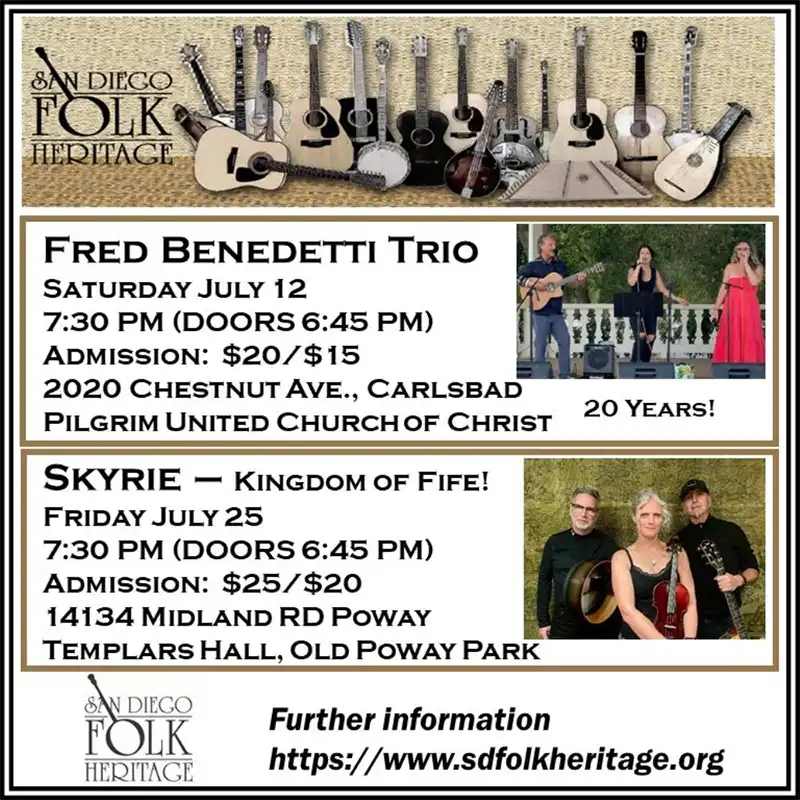CD Reviews
OLD MAN FRED with DONNIE THE KID: Behind These Walls — A Prisoner’s Story

In the June 2011 issue of the San Diego Troubadour, I profiled the father and son behind one of the most compelling musical stories I’ve ever heard, that of Old Man Fred and Jack Phillips. Old Man Fred — a stage name used because this is how Jack refers to his father — has spent the last few years performing songs written by his son, which document his trajectory through California’s state prison system. The music began with lyrics and chords sent by mail, followed by collect calls home where Jack would sing down the phone line as Fred captured the melody and structure using a dictaphone. Fred would then transcribe the music on piano before learning them on the guitar. During his time performing and readings from Jack’s letters at coffee houses in San Diego, Old Man Fred also attracted the attention of another local performer, Don Strandberg. Two years to the day since writing that piece, I have the privilege of reviewing Fred and Don’s collaboration and the first recorded collection of these spectacular central California country songs.
The beauty of Jack Phillips’ songs are their “cut-to-the-quick” simplicity both in musicality and lyrical directness. “Where are you now?/It’s Friday night and I hope you’re having a ball/’cause you’re out there/and I’m stuck behind these walls”, from the album’s title and opening track “Behind These Walls” breaks your heart on impact. With little more than a strummed nylon string guitar, a tastefully felt steel string slide, Fred’s voice perfectly capturing a lethargic tone the human predicament of long-term incarceration will assuredly create. As the record ignites and progresses through it’s third and fourth tracks, the nylon string is replaced with a second steel-string guitar that gives a little extra bite to this sparse yet effective instrumentation. “Confessions Of An Outlaw” and “Disappearing Years” work well sequenced together as they juxtapose Jack’s retelling of the events that led him to prison and the hindsight lament he now feels. Strandberg’s beautifully executed harmony vocals on the latter track offer a different facet to the production, adding another layer of interest in the incredibly unlikely event that you can tear yourself away from the emotional wrench of the lyrics. The Dylan-esque “My Love” addresses a rarely sung realism to the heart-break associated with leaving a lover on the outside as the narrator is locked away, “Letters every couple of months won’t help much/and I don’t need to worry about some fella comin’ round your house/you got your own damn life to live now/and I won’t have too much left by the time that I get out.” This track ends pragmatically with, “It’s alright/I don’t need nobody/don’t nobody need me/hey, I still got my pride/please don’t the take the last thing from me my love.” The country blues of “The Arizona” continues a hardened lyrical approach with its questioning refrain “Were the good times really that good?” It’s at this point in the record that you really begin to get a sense of the mental pendulum endured by those on the sharp end of the prison system, another testament to the masterful sequencing of this album. Almost as eye-opening as Jack’s personal stories are those he tells of his fellow inmates: Josh, Todd, Hillbilly, Larry “Fingers” Gonzalez… Highlighting the names and stories of those the outside world has forgotten is a jarring realization of the depth of human tragedy that results from human tragedy. We may hear the odd story from time to time, but while the news media glibly quotes the statistics, this stark non-fiction becomes all too real through Jack’s words. “The Drugs Ain’t Working” portrays addiction as an attractive woman and sits squarely in the center of the record as though it’s a root to the rest of the madness. “Picture On My Wall”, one of my personal live favorites, shines as a stand-out track on the record both musically and lyrically; “You’re just a dream that I can’t touch/the pride before the fall/you’re just a number that I call/the perfect paper doll/a picture on my wall.” For a brief moment, Behind These Walls stylistically dips into the realm of murder ballads for the haunting walking country blues of “Revelations” before finding a dry sense of humor with the self-effacing “Four Leaf Clover Type O’ Fool”: “Well I guess it’s just the Irish in me/I love to get beat but I won’t admit defeat/I drink my booze and then I fight and lose/Because I’m a four leaf type o’ fool.”
Nine of Behind These Walls 23 tracks feature spoken word excerpts from Jack’s letters home, a recorded example of those Fred shares during his live performances. These glimpses into the struggle this family has endured for almost a decade, only amplified by Strandberg’s steel-string lead lines, deliver the final blow and true magnitude of their story. “I truly believe that the type of closeness we have — you, mom, and me — is extremely rare; both in here and out there. I treasure that relationship” (from “Tehachapi”). This track also localizes the album for a San Diego audience while immediately underlining the strength of Fred and Jack’s relationship; “… even if you have no good news on the Padres and it takes be almost half an hour to decipher some of your words. It’s kinda like you’re writing in code so only I can read it.” “Josh” highlights Fred and Jack’s differing religious and political beliefs, but also their aligned human ideology through Jack’s interactions and conversations with a fellow inmate; Strandberg’s stellar slide guitar performance absolutely shines on this track. The trilogy of “Losing My Guitar,” “The Blues,” and “The Hole” pepper and punctuate tracks 12 through 17 and document the harder side of prison life; the associations with differing inmates that color the way you’re viewed among the community, the staff who trip on their own perception of their power, and the hardships you can face when you let them get the better of you. “Corcoran” (mislabeled on the song listing as the first of two tracks titled “I’m So Tired”) finds Jack at his most vulnerable, likely finding solace in his words almost as if by writing his feelings he can administer enough self-therapy to steel himself for the next round: “It is impossible to express in words the feeling I get when I wake up each morning and have to start the fight all over again.” The song that follows however contains some of Jack’s best writing and discovers poignancy through his exhaustion, while betraying the hopelessness that can so easily be found in his situation; “I’ve loved hate/And I’ve lived death/Poisoned fate/Burned the waters left/I’ve been down so long I fear there’s no more coming up/I’ve lost myself.” Stylistically, “I’m So Tired” appears to be the nadir of the emotion behind the narration of Behind These Walls as the final three tracks begin to lighten with the down-tempo country waltz of “I Grew Up a-Dreamin’.” The spoken word “Watching Jay Leno” brings warmth back into the dialogue when Jack confides in his mother, “I also get some comfort from watching Jay Leno’s show and knowing that you are watching too. We’re watching together on a couch that’s a few-hundred miles long.” Behind The Walls closes with the live favorite, “Light On The Hill,” conjuring the ghoulish silhouette of San Luis Obispo state prison and its inhabitants as poetically as any Tom Waits song ever could.
This is not a record to be judged. It is an incredibly personal relationship, shared publicly in the bravest of ways. Over its hour-long run, you could pick at the production here and there, but you’d be a fool for doing so. We can all relate to music in some way, whether as a listener, performer or critic, but with so many half-truths and outright fantasy present in popular music today, it can be hard to decipher the truth and in many cases harder to relate. Behind These Walls is not a work of fiction; it is as truer example of art imitating life as you are ever likely to find and should be an essential addition to any acoustic, folk, or country music collection. This life, these words and this music are as real as it gets. Listen and learn Jack’s story, realize how lucky you are and how good your life is, then rejoice in the human victory that is Old Man Fred’s love for his son and the music they make together.





